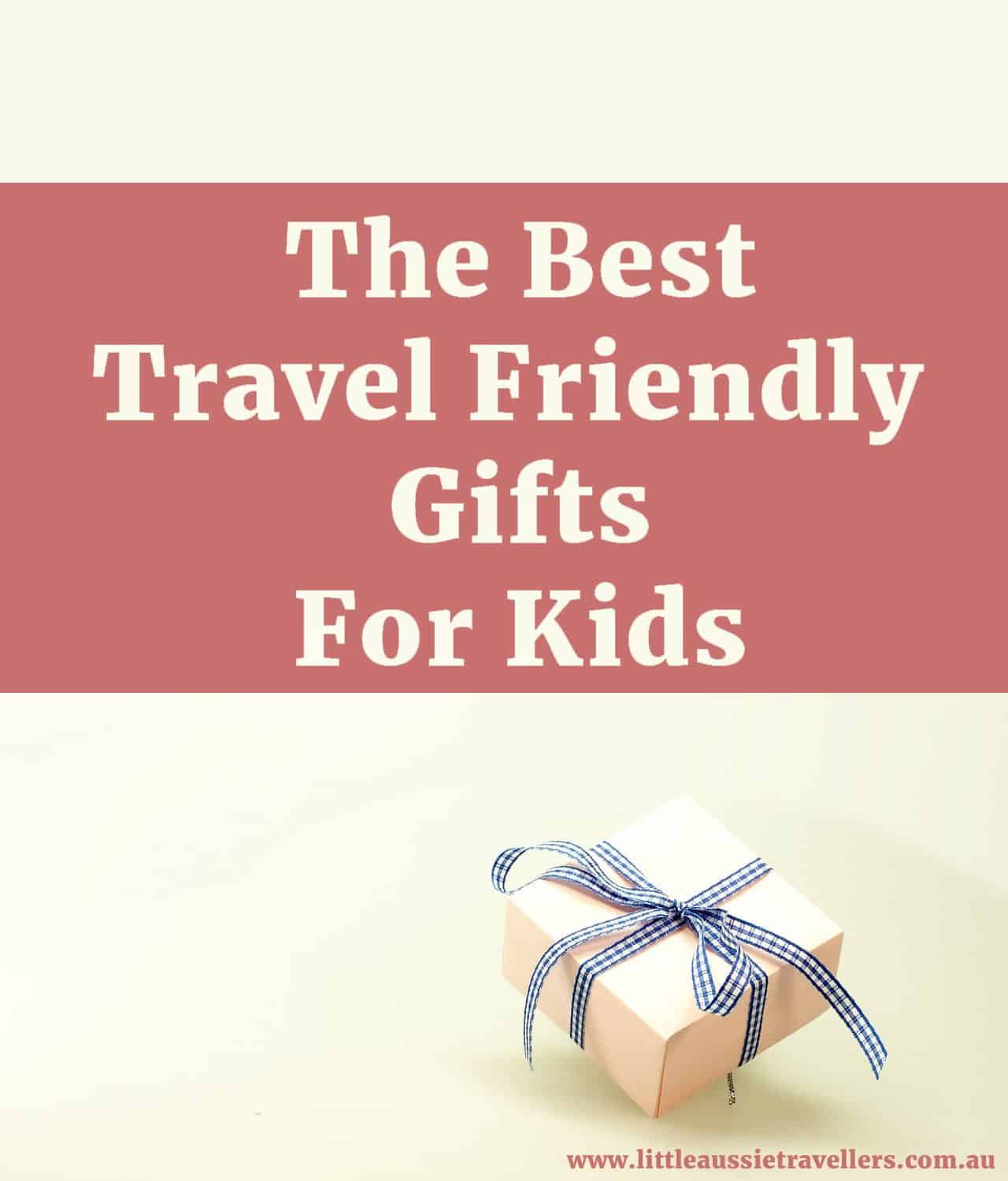
by Loreena Walsh | Australian Travel News, Family Travel, Featured Posts, Gear Guide
There is so much excitement for kids who are heading off to travel, and often friends and family want to buy farewell gifts for kids or their parents to send them off. What many people don’t realise though, is that space is really limited for travelling families, and weight is also a constant juggle – there’s only so much that is legally able to be carried, so buying thoughtful gifts is really lovely, but we’ve got some great tips and ideas for the best travel gifts for kids or families who are about to head off on their trip around Australia.
I’ve decided to update this post for 2019, as now our children are older, things have changed. A lot. Both of my teenagers are now well into skincare & makeup for example, so something for my daughter like a gorgeous Beauty Advent Calendar would be practical and fun. So would I recommend the same gifts for travelling kids as I did when the kids were smaller? Some of them, but there are some other ideas I think are great options, so I’ve added a few more.
We all know there are long car rides, and hours of down time when we’re out on the road travelling, so figet toys are the perfect solution to keep kids occupied.
Fidget toys are generally small, compact and easy to take on the road without taking up too much of your valuable packing space. Brands such as Tangle fidget toys and Speks fidget and manipulative toys for children and adults are such a great solution.
If you haven’t looked at these types of toys for kids, they’re a great option for packing small and light and still having fun activities on the road.
2. Buy A Great Travel Journal for Kids or Adults.
This is still one of the best travelling gifts for kids. It’s actually the perfect travel gift idea for the entire family!.
It doesn’t matter if it’s Mum and Dad, or for the kids; travel journals are the perfect way for travellers to capture all the treasured moments on their journey. From destinations that are loved, to special experiences, drawing pictures, writing stories, sticking postcards, dried leaves, dried flowers, adding photographs. Journals help to create a timeless keepsake that will be a treasured family item for many, many years to come.
One thing I realise about travel, is that while you’re there, in the action, soaking up the landscapes, the conversations, the ever-changing destinations, that you never think you’ll forget. There are parts of our trip that I can barely remember, but having a journal to look back on has ensured that I can re-live the moment, and it’s such a fabulous glimmer of joy reading and remembering the little things that happened along the way that were special to us!
3. Travel-Friendly Art & Craft Supplies.
Whether it’s to write in their journal, help with their schoolwork or send letters and pictures back home to friends and family, travelling kids will love art and craft supplies to take along with them. Watercolour paints are a great option as they aren’t as messy as other paint options and don’t take much to clean up.
Pencils and pens are perfect for writing, drawing and colouring, as are notebooks and writing paper, both of which will come in handy for keeping kids occupied on long journeys and if they want to jot down notes or create artwork to represent their travels.
For our children’s travel journals we began with an A5 folder, with loose inserts from Office Works. That way they could move pages around, add photos once we’d had them printed, brochures, keepsakes, and remove a page if they felt like they didn’t want to include it any more. They also used their art and craft supplies to send special pictures and letters home to family and friends. The gift of stamps is also a great idea if you’d like to receive a postcard from your little adventurers!
4. Binoculars Make Great Travel Gifts for Kids.
Binoculars are a great gift idea for kids who are travelling. The ability to spot things at a long distance will help kids feel immersed in their surroundings and see things they won’t otherwise be able to spot. Wildlife, interesting scenery, they’ll love the faraway goodies they’ll spot through their new binoculars.
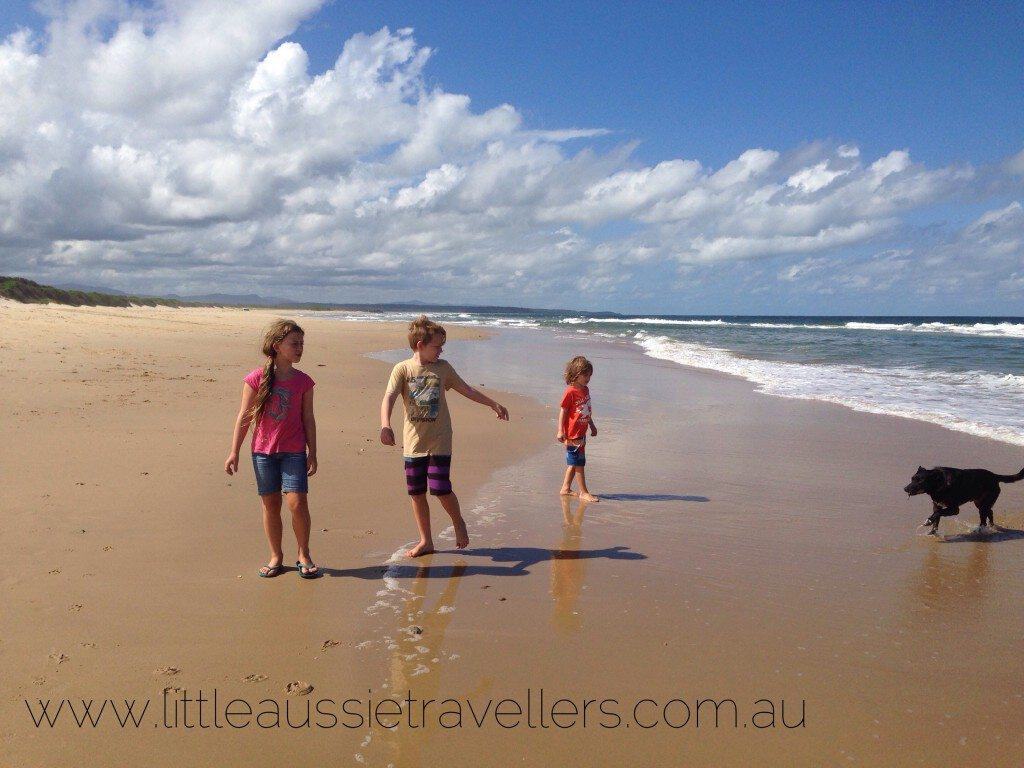
5. Compact & Multi-use Toy Ideas for Travelling Kids
One of the basic toys we considered a must-have when we hit the road was Lego. Not only is it a great toy for building things like we all know, it’s also a wonderful tool for learning maths too! Lego is great for solo play or group play and suitable for kids (and adults) of all ages. Other great ideas include block games like Jenga, the blocks for this game can not only be used to play but also double as building blocks or math blocks too. Marbles, decks of cards, Uno, travel versions of games like scrabble and battleship are all available too. Look for games and toys that are compact or can be taken out of their bulky boxes and easily stored.
6. Tech Gifts for Travelling Families
Depending on the ages of the children, cameras and other tech gadgets can work really well. For cameras, polaroids work well for adding scenic photos or selfies into travel journals, but digital cameras work well for capturing lots of photos and deciding what to print later. Expensive cameras aren’t necessary, just look for something of reasonable quality and the kids will love it. Cameras that are shock proof and waterproof would definitely be an ideal, although more expensive option. Ipods and Ipads are also a much loved travel gadget, as are iTunes gift cards a loved gift for kids who own these devices.
7. Everyday Necessities Especially For Older Children and Teens.
As I mentioned above, now are children are older, I reflect on the things that would make sense for tweens and teens to be gifted for travel. Personal care items are a wonderful gift idea for older kids. I mentioned Beauty Advent Calendars, and my daughter would absolutely adore a gift like this both when we were travelling or now we’re settled down. The bonus is that the items inside are compact in size and great for travelling.
For my son, who now shaves, shave gear, spare razors, cologne, all of this can be expensive to buy on the road in more remote places, so a little gift basket of goodies would be a fabulous idea.
Of course no matter what, gifts that come from the heart are always welcome by any family. When it comes to travel gifts for kids, If you think about items that kids can use, are small, compact and won’t just take up space, you’ll have happy kids and happy parents, and most importantly, happy, smiling travellers!
What about other special events like Mother’s Day gifting, Father’s Day gifting or even Christmas gift ideas for living on the road? We’ll cover those in another post soon.
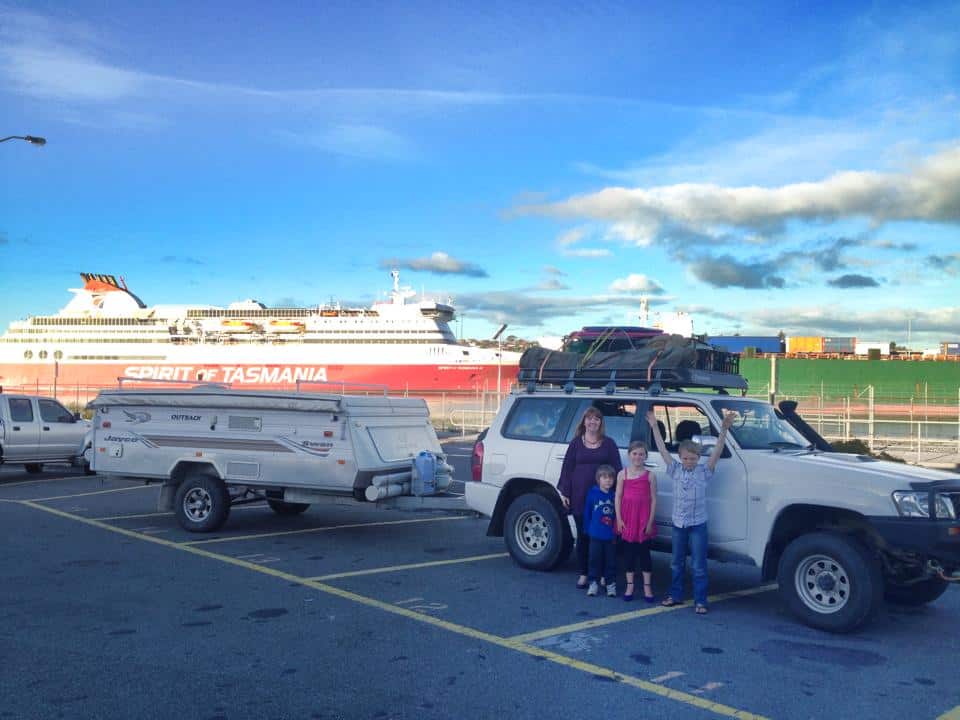
by Loreena Walsh | Gear Guide
Most people planning to travel long term worry about whether a
camper trailer or caravan is best for travelling Australia? Some people will choose a motorhome, but if you’re going to be towing your home behind you, possibly the biggest consideration should be given to the type of car you’ll be towing with, as well as maintenance and preparation for keeping that car in great condition and suitable for long term travel.
Car Preparation Before You Leave for a Lap of Australia
First things first, please be sure the car you have is a suitable car for towing your caravan or camper. Having a car that is under-rated for the van or camper you are towing is not only illegal, it is also extremely dangerous and happens regularly unfortunately. Once you have the car sorted, here’s some tips before you hit the road for long term family travel.
- Be sure to do a full service on your vehicle, this includes changing your oil, fuel and air filters, and any gear box and transmission fluids. It’s great to do them all before you head off so you’ll know for certain when they are all due again.
- Check all drive belts or other belts and change them if necessary, if possible take spares, there’s nothing worse than a broken belt and no supplies close by, they are relatively cheap.
- Tyres are really important to ensure safety, especially when driving long distances. If you’re due for a change of tyres, it’s probably best just to replace them all around the vehicle.
- Wheel bearings are also something to get checked before you head off. If you put your car into a mechanic to get a full service before you leave, ask them to check for you.
- It’s vital that your brakes are in great working order when you’re towing so be sure to make sure you’re brakes are in great working order, if in doubt replace what might need replacing when on the road anyway.
Car Maintenance Tips While Travelling Long Term
Keeping your car healthy during long term travel ins’t too much of a hassle as long as you take the time to keep essential tasks done.
- Check water levels and oil on a regular basis. Yes this sounds simple enough, but forgetting these things can be disastrous especially if you’re in a remote area.
- Do regular oil changes. For some cars, especially if they are under the stress of towing will be best suited to changing oil more regularly than otherwise recommended by manufacturers. Many people swear by changing oil every 5,000 or 10,000 kms minimum. It’s not a hard job to do on the road, but please be sure to dispose of oil wastage responsibly and take it to an allocated waste station.
- Upgrading tyres on the road will be a necessity if you’re travelling long term. Our tyres were fine when we left, but we’re now shopping for new ones. We’re looking at BF Goodrich tyres at tyresales.com.au which is a great website to save money on what can be a pretty big expense.
- Take some spare parts with you to avoid disaster. We try our best to carry essential belts, wheel bearings, and spare filters with us. These things can all be maintained on the road, and save us needing to go to a mechanic and wait for parts to be ordered.
Most of all, just stay safe, use common sense, treat your vehicle kindly, after all, it’s what keeps you moving and on the road. Major vehicle issues can push people off the road for quite some time, so err on the side of caution and being that little bit extra careful and you should enjoy many long days, weeks, months or years travelling Australia on your big lap.
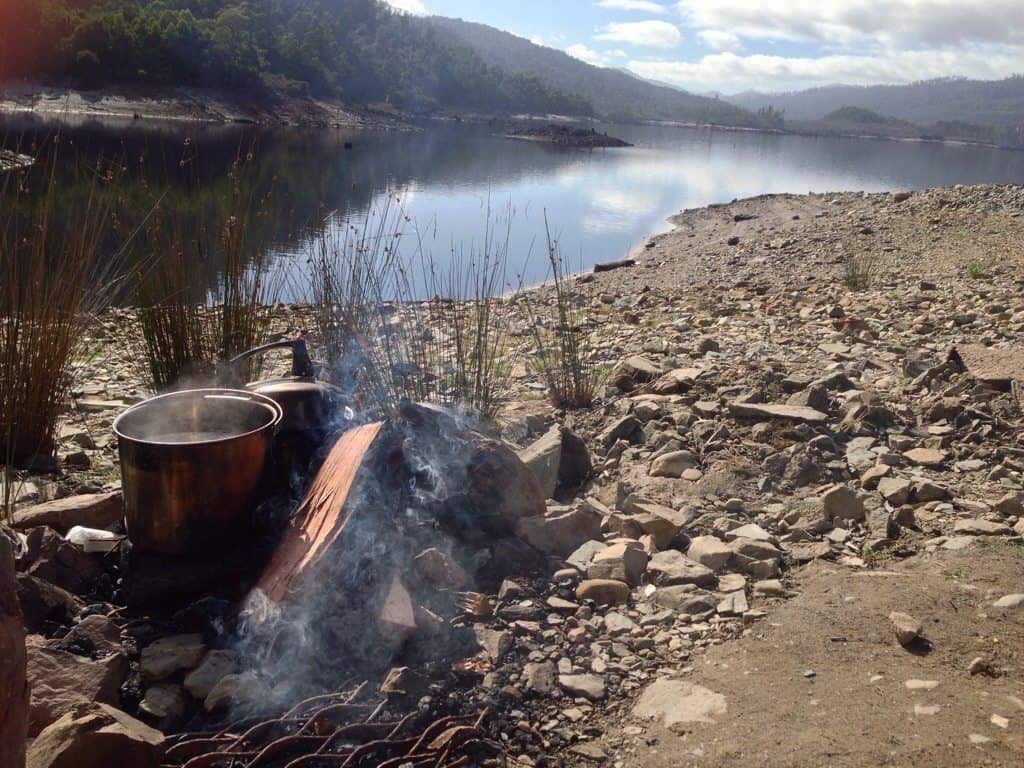
by Loreena Walsh | Camping, Gear Guide
One of the big considerations when you decide to travel, especially if you aim to free camp, is having showers and staying clean. Gone will be the days of unlimited streaming hot water, and long hot baths, but it’s really just a case of being practical, thrifty and sensible and once you find your groove it’s not too hard at all. We get lots of emails asking about shower set ups for free camping and travelling on long term family holidays, so here’s some starting pointers.
Options for keeping clean quickly while travelling?
Quick and Easy Travel Hygiene
Let’s get honest here, some days it’s just not possible to have a full wash. It may be too cold, you may be driving all day and not arrive to camp until late, or there’s just such limited water having fresh drinking water is more important. Never fear, you can always freshen up if you carry 2 important items:
1: Baby wipes
2: Hand Sanitiser – The water-free kind.
Baby wipes are great for an all over clean up, or just the vital areas. Hand Sanitiser allows you to ensure your hands are clean and hygienic, so a combination of these works great for a light freshen up.
Water Saving Travel Bath
It’s surprising how effective a sponge bath can be. This is a common option for campers and travellers when there isn’t another option.
A small bucket or large bowl can be filled with warm water and a face washer or cloth is all you need to get a thorough clean. For travelling families who need a little privacy a shower tent is a great idea.
Another handy thing to know is that using sensitive skin, soap free options will still clean you but you don’t have to worry about the skin-drying soap residue if you don’t have running water to rinse with.
Camp Showers while Travelling
The ultimate in shower options for Travellers and campers is to imitate a “real” shower as closely as possible, and this is where camp showers come in.
There’s several levels of luxury and lots of options available, so here goes:
Solar Shower Bags For Campers
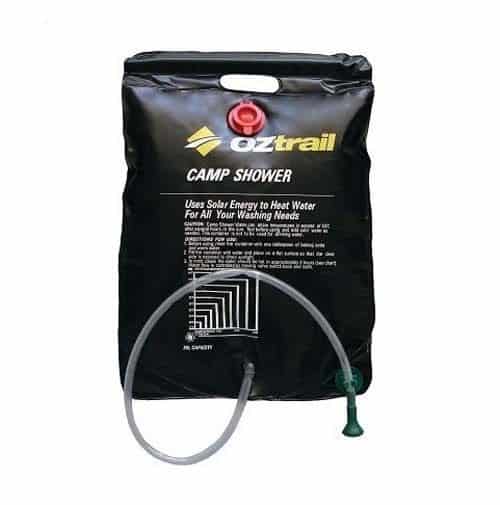
This option is a tried and true remedy for accessing heated shower water when camping. Black rubber bags are laid in the sun for a natural heating method. It’s best suited to when you are staying more than one night as the water bladder will need to lay in the sun for the day. Similarly it’s better for warm regions as the bags won’t heat properly on cold, overcast, rainy days.
12 Volt Shower & Heat Your Own Water
Of all travelling families we’ve spoken to, this option is probably one of the most common options for showering while camping. It’s simply the use of a portable 12 volt shower pump.
Heat up some water, over the camp fire is a great option for saving gas and making the most of the fire, other than that, just on the gas stove will do.
Mix the hot water into a bucket with some cool water until it’s the right temperature and then use this and the portable shower to wash.
12 Volt showers are mostly hooked up to a battery, either the car, or a spare to run the shower pump which is immersed in the bucket of warm water.
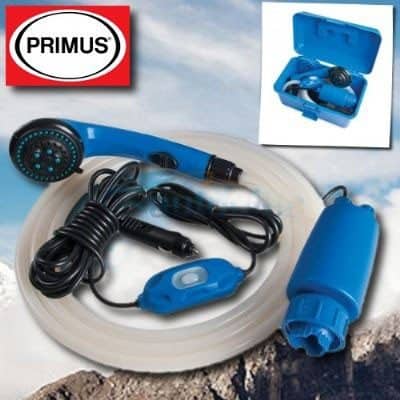
Complete Hot Water Units.
For those who don’t want to worry about having to pre-heat water, the use of a hot water service offers even more convenience. You’ll still need a bucket of water, but instead of having to preheat, the 12 volt shower runs as part of the hot water service, which has an adjustable temperature gauge on it. Brands such as Coleman hot water on demand, and Companion Aquacube are popular choices.
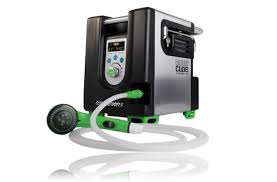
Top Tips for Camp Showers
The vital ingredient for this type of shower is the shower tent. These range from pop-up kinds to more sturdy dual ensuite options. Regardless of which one you purchase, it will provide welcome privacy for both a shower, and if you carry one, a portable toilet.
It’s a great idea to put some foat matting at the bottom of your shower tent to keep your feet clean and allow the water to run away. This type of matting is available at camping and discount stores.
When camped near a clean power supply such as a river or lake, this will allow you to use available water supplies instead of water that’s better saved for drinking and cooking. If you can make out in our photo here, we’ve got 3 pots of water on the fire to save on the gas so we could have enough hot water to wash everyone. It took a few rounds of water, but the water from the lake was fresh and beautiful, and it was a lovely warm day, perfect for a good clean up for the kids.
What tips do you have for camp showers while travelling?

by Loreena Walsh | Gear Guide

So you’re heading off for a family holiday, the first thing you should pack is your family holiday first aid kit. While a basic first aid kit is fine, it’s much better if it contains things that are useful for your travel destination.
Whether your taking a road trip, going camping in a remote area, or spending your days lounging around a resort, there’s a chance you’ll need a first aid kit at least once during your travels. If you’re heading to remote areas or doing a lot of outdoor activities, not only is it essential to pack a well equipped first aid kit, it could save your life.
For families who do a lot of remote travel, it’s a great idea that one parent has a first aid certificate, or at least attends a first aid course to teach the basics. If that isn’t an option, then a good first aid guide that fits into your kit is a great option too.
What Basic Things Should A First Aid Kit Contain?
Every first aid kit should contain the following essential items:
- Band-aids
- Sterile gauze
- Saline (can be used to flush wounds or eyes etc)
- Insect repellent
- Burn cream
- Bite cream
- Scissors
- Safety pins
- Tweezers
- Sunscreen
- Paracetamol or Ibuprofen
- Sterile gauze
- Non adherent dressings
- A couple of bandages
- Notepad & pen/pencil
- Antiseptic wipes
- Gloves
- Paw paw cream
- Tea tree oil
- Resuscitation protective shield
For more remote travel you should also consider adding the following to your first aid kit:
- Emergency thermo blanket
- Cold packs or heat packs (instant type)
- Snake bite kit, containing compression bandages, a sharpie, gloves and a sling
- EPIRB in case of needing remote or urgent assistance
- A Satellite phone for remote/out of service travels
- Gauze swabs
- Thermometer
- Torch
- Senekot or similar
- Sudafed or similar
- Immodium or similar
- Menstruation pads/tampons
- Oil of cloves
Choosing A First Aid Kit
If you’re really wanting to have a specific kit with particular items, then designing and purchasing your own kit is definitely a great idea. Either that, or purchasing a ready made kit and adding your own touches to it could be less expensive and more thorough. Brands such as St Johns Ambulance or Red Cross offer thorough, high quality kits for sale. No matter which kit you purchase or how you put it together, it’s important that each time you head out (or if you’re on the road full time) that you check the expiry date of your first aid kit contents regularly or before you head away on holidays.
Do you have any tips, advice or preference when it comes to Family holiday First aid kit ideas for travellers? Let us know below in the comments…
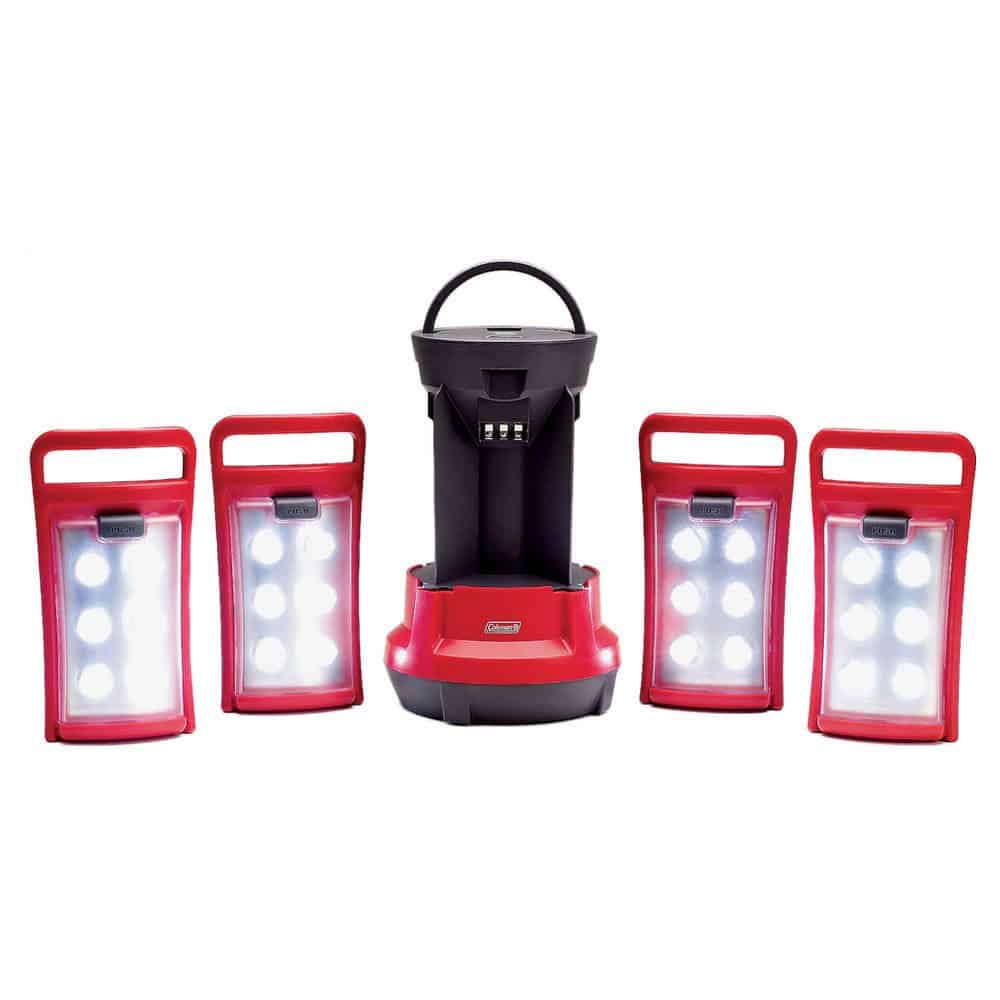
by Loreena Walsh | Gear Guide
When it comes to the best camping gear for families, we know how to put it to the test.
Torches are no exception to this rule. As a family of 5 you can be sure that at least 3 of us will end up needing a torch at exactly the same moment.
While in the past, such a situation may have caused all sorts of chaos and tantrums to take place, as we scrambled in the darkness to locate enough torches for everyone (if we’d even remembered to pack enough torches) during a visit to our local camping store, we were really excited to find a product that we figured would save all our problems!
The Coleman Quad LED Torch – Great For Families
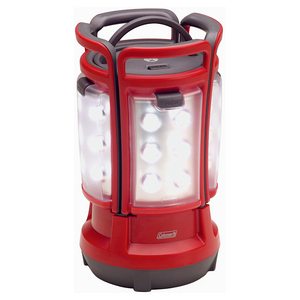
This lantern offers a unique design that gives great flexibility to families, or groups that are camping, or, for that matter, even just to have around the house.
The torch can operate as a full lantern, or 4 smaller style lanterns can be removed individually from the centre section, allowing up to 4 people to use the torches individually.
The smaller torches operate by charging from the main unit, which runs on 4 x D size batteries. Surpisingly the batteries last quite some time which is great news if you’ll be away from shops for a while, but to be sure, take spares also.
Do We Recommend This Product?
We sure do! It offers great flexibility for a family, or anyone who might need separate torches. We’ve used ours during power outages, every camp trip and on long drives it’s always in the back of the car in case of emergencies.

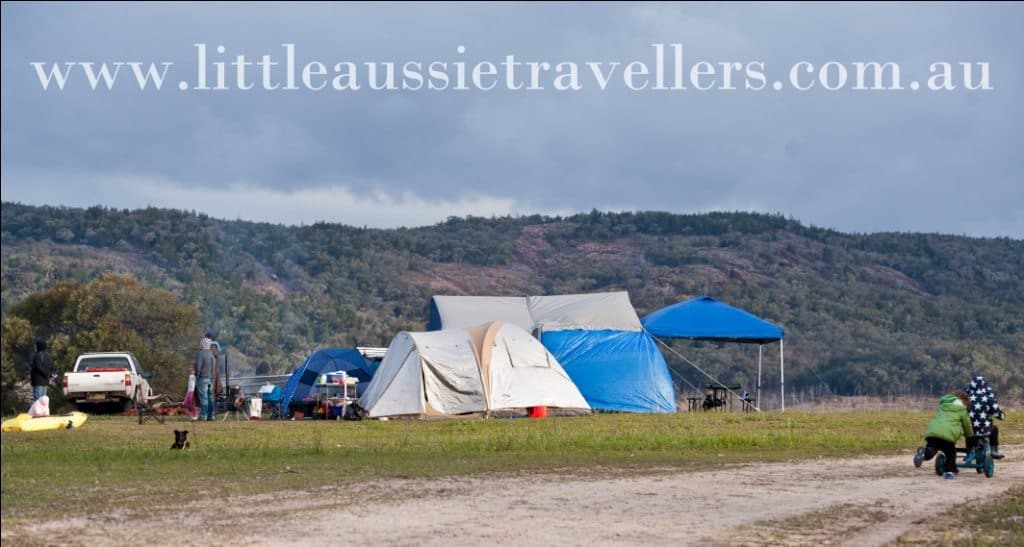
by Loreena Walsh | Camping, Gear Guide
If you’re a family looking for adventure, keen to pitch a tent and explore the great outdoors, then one of the most important things you’ll need to know is how to choose a family tent to be used as your home away from home. Deciding on the right tent is something that should be done with planning, consideration and research. Be sure to physically look at the tents you’re considering and get a thorough idea of the features and price range available in the tent ranges you’re considering. Not sure where to start? The good news is it’s not as hard to find a great tent as it may seem, if you follow some simple tips.
Many people feel overwhelmed when choosing the right tent, simply because of the large range of options that are available, but, by asking yourself some simple questions, the process of choosing a family tent will become a while lot easier.
1. How Will the Tent Be Used?
This may sound like a silly question, the answer is camping, sleeping right? Wrong! Of course those things are true, but there are other important factors that come into play here. Will you be hiking long distances and need to take the tent with you? If so you’ll need to go for compact and light. Will you be staying for extended periods of time? If so then extra space and durability may be necessary. Generally for extended camping trips it’s a much more comfortable experience in a larger tent that has space to stand. Ask yourself what kinds of camping trips you’re likely to be doing and choose a tent that will fit that style well.
2. How Many People Will Be Sleeping in the Tent?
The size of your family will be one of the major deciding factors in the type of tent you purchase. Although do you notice it wasn’t listed in position 1 of the points to consider. That’s because the size of your family won’t always be the major deciding factor in the type of tent. For example, for trips that require a plane flight to get to your destination, or require hiking on foot, a lighter more compact tent is needed. So in this case, even a family of 5 may decide they can squeeze into a 4 man tent for short stays. However if a family loves to camp for weeks on end in one spot, then a 10-12 person multiple room tent may be just what they are looking for. As a rule, the number of people a tent size allocates is for the maximum number of sleeping adults that will fit comfortably. If you’re needing to store clothing etc for 4 people in your tent, then it wouldn’t be wise to buy a 4 person tent (unless for short hiking trips) a family of 4 would more likely look at 6person and above for these purposes.

3. Where and When do Your Family Camping Holidays Take Place?
Going back to the first two points, the next point to consider is the likely location and timing of your camping trips. If you know you will be camping in summer then a tent with great ventilation is an absolute must! Tents with inadequate windows, lack of fly screening and ventilation points will fast become unbearably hot during the Aussie summer heat, so take this into consideration. If you know you’re likely to do some camping during wet periods or areas where there’s high dew levels at night, then it’s vital to have a tent that is waterproof, has zippers that won’t leak and sturdy flooring that won’t allow the water to penetrate. It’s important to understand that even family camping trips can be inundated with all kinds of weather, so tents that offer these features are always a bonus.
4. Budget Vs Quality
When it comes to the final decision for the tent, the reality is, that the tent you purchase will come down to price vs quality. Once you know where you’ll be using your tent and for what purpose, and how many people you need to accommodate with an average time of stay, then the final decision will be the pricing and quality.
There is such a large variety of pricing across tent ranges, but generally with that pricing range comes a huge range in the extra features and also a major difference in quality. For many families, purchasing a top of the range, ultra expensive tent may be out of the question, but be sure at least to look at the top of the range tent with the features that will suit you, then take a look at the bottom of the range. Once you have an idea of what’s on either end of the price scale, it’s wise to go with an option somwhere in between.
5. Finally….
No matter what tent you choose, be sure to hold onto your purchase receipt, as a good tent should come with a warranty period, and be free from defects. Before you head out on your first camping trip with your new tent, it always pays to do a mock setup at home (or let the kids have a camping trip in the backyard) so you get to know how to set the tent up and pack it down. It’s much more fun if you arrive at your campsite knowing how to pitch your tent instead of wasting time trying to figure it out instead of relaxing!
[wp_ad_camp_1]
Now you’ve got your tent sorted, the next decision will be choosing sleep gear for family camping!





















